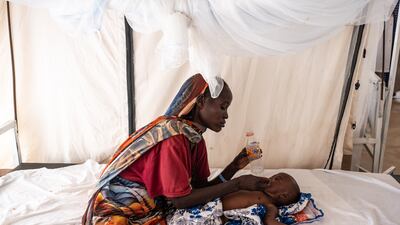Education and self-reliance are at the heart of this year’s Global Refugee Forum in Geneva, organisers have said.
The refugee conference opens on Wednesday, with the aim of finding support for countries hosting the largest number of refugees.
Every four years, the event brings together heads of state, NGOs, refugee delegates and international agencies to discuss the solutions for the world’s growing refugee populations.
The need for the forum had become “more urgent than ever”, Perveen Ali, a UN senior policy adviser who organised the forum, told The National.
There are currently about 36 million refugees in the world, according to UN figures – Ms Ali said the number is “higher than ever before”.
About three quarters of refugees are living in low to middle-income neighbouring countries.
Yet these host countries tend to be facing economic pressures of their own.
“They are bearing the largest share of the burden and responsibility of hosting refugees,” said Ms Ali.
Filippo Grandi, head of the UN refugee agency, wrote in The Observer recently: “Every refugee is a symptom of our collective failure to ensure peace and security.
“Refugee situations don’t have to turn into crises if we work together to address and manage them.”
This year, the forum's focus is on climate action education and labour mobility.
One major push that is currently being developed will seek to finance the inclusion of refugees in national education systems.
Afghan refugees leave Pakistan - in pictures
“It’s really focused on finding ways to bring more support to the big hosting countries that are middle and low income, to bolster their national education so that they can include refugees,” Ms Ali explained.
Countries in the Middle East are expected to play a leading role, and the forum will be co-convened by Jordan, alongside France, Japan, Colombia and Uganda.
Jordan hosts the largest number of refugees relative to its population worldwide, which Ms Ali described as a “model for refugee inclusion”.
“We’re hoping the good practices that Jordan has undertaken will be supported,” she said.
Egypt is leading a pledge on peace-building alongside Colombia, Norway and the UN, which will seek to address the “root causes of forced displacement” and ensure the “dignified” return of displaced people.
Head of UN Refugees agency calls for humanitarian ceasefire in Gaza and return to negotiations - video
Among Egypt’s own commitments will be to support post-conflict reconstruction in East Africa and address the impact of climate change across the continent.
Foreign Minister Sameh Shoukry will speak at an event on Wednesday on the ways that peace-building and conflict prevention can support the return of refugees to their home countries.
Lebanon's caretaker Prime Minister Najib Mikati is among the heads of government expected to attend.

“Refugees want self-reliance. A productive refugee is a contributor, rather than a burden, to their hosts,” said Arafat Jamal, the forum’s co-ordinator, said at a briefing on Friday.
He urged “wealthier nations” to support education, labour mobility and family reunification, and highlighted the need to “create conditions so that refugees can return home in safety and dignity”.
The forum will build on the findings of the last event, which found that “there are no humanitarian solutions to political problems”, according to Mr Jamal.
“Now, there is a growing recognition that we must pay more attention to root causes,” he added.














